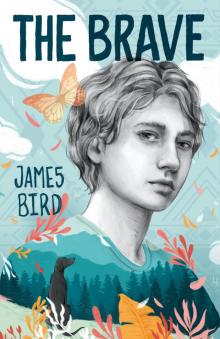- Home
- Nicholas Evans
The Loop
The Loop Read online
The Loop
NICHOLAS EVANS
Hachette Digital
www.littlebrown.co.uk
Table of Contents
Title Page
Copyright Page
Dedication
Acknowledgements
SUMMER
Chapter 1
Chapter 2
Chapter 3
Chapter 4
Chapter 5
Chapter 6
Chapter 7
Chapter 8
Chapter 9
Chapter 10
Chapter 11
FALL
Chapter 12
Chapter 13
Chapter 14
Chapter 15
Chapter 16
Chapter 17
Chapter 18
Chapter 19
Chapter 20
Chapter 21
Chapter 22
Chapter 23
WINTER
Chapter 24
Chapter 25
Chapter 26
Chapter 27
Chapter 28
Chapter 29
Chapter 30
Chapter 31
SPRING
Chapter 32
Chapter 33
Chapter 34
Chapter 35
SUMMER
Chapter 36
Teaser chapter
Nicholas Evans was born and grew up in Worcestershire. Before writing his first novel, The Horse Whisperer – later made into a film directed by Robert Redford – he worked as a journalist, film producer and screenwriter. His latest novel is The Divide. Nicholas Evans lives in Devon.
‘Compelling . . . a love story . . . The issues raised in Nicholas Evans’s book are fascinating. Whenever men and wolves have met, the wolves have lost . . . the descriptions of the lupine way of life is fascinating’
Bernard Cornwell, Daily Mail
‘The real power of the story lies in the details of lupine life, and in the scenes high up in the mountains where the wolves stalk, fight and mate. The silence and the cold nurture an existence older than ours and are described here with a passion that provides a touchstone’
Elizabeth Buchan, The Times
‘The Horse Whisperer . . . conveyed a genuine and personal emotional charge which resonated with millions of readers. The Loop, Evans’s second novel, confirms that he is that rare phenomenon, a natural storyteller’
Mail on Sunday
‘The Loop focuses on the brutality of men and the nobility of nature: emotive stuff’
She
Also by Nicholas Evans
The Horse Whisperer
The Smoke Jumper
The Divide
The Loop
NICHOLAS EVANS
Hachette Digital
www.littlebrown.co.uk
Published by Hachette Digital 2009
Copyright © Nicholas Evans 1998
The moral right of the author has been asserted.
All rights reserved.
No part of this publication may be reproduced,
stored in a retrieval system, or transmitted, in any
form or by any means, without the prior
permission in writing of the publisher, nor be
otherwise circulated in any form of binding or
cover other than that in which it is published and
without a similar condition including this
condition being imposed on the subsequent purchaser.
All characters and events in this publication, other than
those clearly in the public domain, are fictitious, as is the
town of Hope, Montana, and any resemblance to real
persons, living or dead, is purely coincidental.
A CIP catalogue record for this book
is available from the British Library.
eISBN : 978 0 7481 1238 8
This ebook produced by JOUVE, FRANCE
Hachette Digital
An imprint of
Little, Brown Book Group
100 Victoria Embankment
London EC4Y 0DY
An Hachette Livre UK Company
For my mother, Eileen,
and in memory of my father,
Tony Evans
Acknowledgements
Of the books that helped in my research, I am most indebted to: Of Wolves and Men by Barry Lopez, War Against the Wolf edited by Rick McIntyre, Wolf Wars by Hank Fischer, The Wolf by L. David Mech, and The Company of Wolves by Peter Steinhart.
Of the many people who helped, I would particularly like to thank Bob Ream, Doug Smith, Dan McNulty, Ralph Thisted, Sara Walsh, Rachel Wolstenholme, Tim and Terry Tew, Barbara and John Krause, J. T. Weisner, Ray Krone, Bob and Ernestine Neal, Richard Kenck, Jason Campbell, Chuck Jonkel, Jeremy Mossop, Huw Alban Davies, John Clayton, Dan Gibson, Ed Enos, Kim McCann and Sherry Heimgartner.
I am especially grateful to the Cobb family, Ed Bangs, Mike Jiminez, Carter Niemeyer, Bruce Weide, Pat Tucker and Koani, the only wolf I can plausibly call a friend.
Finally, for their patience, support, advice, acuity and friendship while I wrote this book, warmest thanks must go to the following: Linda Shaughnessy, Tracy Devine, Robert Bookman, Caradoc King and my wonderful editors, Carole Baron and Ursula Mackenzie.
Everything the Power of the World
does is done in a circle. The sky is
round and I have heard that the earth
is round like a ball and so are all the stars.
The wind, in its greatest power, whirls.
Birds make their nests in circles,
for theirs is the same religion as ours.
The sun comes forth and goes down
again in a circle. The moon does the
same and both are round. Even the
seasons form a great circle in their
changing and always come back again
to where they were. The life of a man
is a circle from childhood to childhood.
And so it is in everything where power moves.
BLACK ELK, Oglala Sioux
(1863-1950)
SUMMER
1
The scent of slaughter, some believe, can linger in a place for years. They say it lodges in the soil and is slowly sucked through coiling roots so that in time all that grows there, from the smallest lichen to the tallest tree, bears testimony.
Perhaps, as he moved silently down through the forest on that late afternoon, his summer-sleek back brushing lower limbs of pine and fir, the wolf sensed it. And perhaps this vestige of a rumor in his nostrils, that here a hundred years ago so many of his kind were killed, should have made him turn away.
Yet on and down he went.
He had set out the previous evening, leaving the others in the high country where even now, in July, there lingered spring flowers and patches of tired snow in gullies shy of the sun. He had headed north along a high ridge then turned east, following one of the winding rocky canyons that funneled the snowmelt down from the divide to the valleys and plains below. He had kept high, shunning the trails, especially those that ran along the water, where sometimes in this season there were humans. Even through the night, wherever it was possible, he had stayed below the timberline, edging the shadows, in a trot so effortless that his paws seemed to bounce without touching the ground. It was as though his journey had some special purpose.
When the sun rose, he stopped to drink, then found a shaded nook high among the sliprock and slept through the heat of the day.
Now, in this final descent to the valley, the going was more difficult. The forest floor was steep and tangled with blowdown, like tinder in some epic fireplace, and the wolf had to weave his way carefully among it. Sometimes he would double back and find a better r
oute so as not to puncture the silence with the telltale snap of a dead branch. Here and there, the sun broke through the trees to make pools of vivid green foliage and these the wolf would always skirt.
He was a prime four-year-old, the alpha of the pack. He was long in the leg and almost a pure black, with just the faintest haze of gray along his flanks and at his throat and muzzle. Now and again he would pause and lower his head to sniff a bush or a tuft of grass, then lift his leg and make his mark, reclaiming this long-lost place as his own. At other times he would stop and tilt his nose to the air and his eyes would narrow and shine yellow as he read the scented messages that wafted on thermals from the valley below.
Once while doing this, he smelled something closer at hand and he turned his head and saw two white-tailed deer, mother and fawn, no more than a dozen yards away, frozen in a shaft of sunlight, watching him. He stared at them, connecting in an ancient communion that even the fawn understood. And for a long moment, all that moved were the spores and insects that spiraled and glinted above the deers’ heads. Then, as if deer and insect were of equal consequence to a wolf, he looked away and again assessed the air.
From a mile and a half away came the mingled smells of the valley. Of cattle, dogs, the acrid tang of man’s machines. And though he must have known, without ever being taught, the peril of such things, yet on again he went and down, the deer following him with inscrutable black eyes until he was lost among the trees.
The valley which the wolf was now entering ran some ten miles due east in a widening, glacial scoop toward the town of Hope. Its sides were ridged and thick with pine and, viewed from above, seemed to reach out like yearning arms to the great sunbleached plains that stretched from the town’s eastern edge to the horizon and countless more beyond.
At its widest, from ridge to ridge, the valley was almost four miles wide. It was hardly perfect grazing land, though many had made a living from it and one or two grown rich. There was too much sage and too much rock and whenever the pasture seemed about to roll, some coulee or creek, choked with scrub and boulders, would gouge through and cut it off. Halfway down the valley, several of these creeks converged and formed the river which wound its way through stands of cottonwood to Hope and on from there to the Missouri.
All of this could be surveyed from where the wolf now stood. He was on a limestone crag that jutted from the trees like the prow of a fossilized ship. Below it, the land fell away sharply in a wedge-shaped scar of tumbled rock and, below that, both mountain and forest gave way grudgingly to pasture. A straggle of black cows and calves were grazing lazily at their shadows and beyond them, at the foot of the meadow, stood a small ranch house.
It had been built on elevated ground above the bend of a creek whose banks bristled with willow and chokecherry. There were barns to one side and white-fenced corrals. The house itself was of clapboard, freshly painted a deep oxblood. Along its southern side ran a porch that now, as the sun elbowed into the mountains, was bathed in a last throw of golden light. The windows along the porch had been opened wide and net curtains stirred in what passed for a breeze.
From somewhere inside floated the babble of a radio and maybe it was this that made it hard for whoever was at home to hear the crying of the baby. The dark blue buggy on the porch rocked a little and a pair of pink arms stretched craving for attention from its rim. But no one came. And at last, distracted by the play of sunlight on his hands and forearms, the baby gave up and began to coo instead.
The only one who heard was the wolf.
Kathy and Clyde Hicks had lived out here in the red house for nearly two years now and, if Kathy were honest with herself (which, on the whole, she preferred not to be, because mostly you couldn’t do anything about it, so why give yourself a hard time?), she hated it.
Well, hate was maybe too big a word. The summers were okay. But even then, you always had the feeling that you were too far away from civilization; too exposed. The winters didn’t bear thinking about.
They’d moved up here two years ago, right after they got married. Kathy had hoped having the baby might change how she felt about the place and in a way it had. At least she had someone to talk to when Clyde was out working the ranch, even though the conversation, as yet, was kind of one-way.
She was twenty-three and sometimes she wished she’d waited a few years to get married, instead of doing it straight out of college. She had a degree in agri-business management from Montana State in Bozeman and the only use she’d ever made of it was the three days a week she spent shuffling her daddy’s paperwork around down at the main ranch house.
Kathy still thought of her parents’ place as home and often got into trouble with Clyde for calling it that. It was only a couple of miles down the road, but whenever she’d spent the day there and got in the car to come back up here, she would feel something turn inside her that wasn’t quite an ache, more a sort of dull regret. She would quickly push it aside by jabbering to the baby in the back or by finding some country music on the car radio, turning it up real loud and singing along.
She had her favorite station on now and as she stood at the sink shucking the corn and looking out at the dogs sleeping in the sun by the barns, she started to feel better. They were playing that number she liked, by the Canadian woman with the ball-breaker voice, telling her man how good it felt when he ‘cranked her tractor’. It always made Kathy laugh.
God, really, she should count her blessings. Clyde was as fine a husband as any woman could hope for. Though not the richest (and, okay, maybe not the brightest either), he’d been, by a long way, the best-looking guy at college. When he’d proposed, on graduation day, Kathy’s friends had been sick with envy. And now he’d given her a beautiful, healthy baby. And even if this place was at the back end of nowhere, it was still a place of their own. There were plenty of folk her age in Hope who’d give their right arms for it. Plus, she was tall, had great hair and even though she hadn’t quite got her figure back after having the baby, she still knew her looks could crank any tractor she chose.
Self-esteem had never been a problem for Kathy. She was Buck Calder’s daughter and around these parts that was about as big a thing to be as there was. Her daddy’s ranch was one of the largest spreads this side of Helena and Kathy had grown up feeling like the local princess. One of the few things she didn’t like about being married was giving up her name. She had even suggested to Clyde that she might do what those big-shot career women did nowadays and go double-barreled, call herself Kathy Calder Hicks. Clyde had said fine, whatever, but she could see he wasn’t keen on the idea and so as not to hurt him she’d settled for plain old Kathy Hicks.
She looked up at the clock. It was getting on for six. Clyde and her daddy were down in the hay fields, fixing some irrigation, and they were all coming over for supper around seven. Her mom was due any minute with a pie she’d baked for dessert. Kathy cleared the mess out of the sink and put the corn into a pan on the stove. She wiped her hands on her apron and turned the radio down. All she had left to do was peel the potatoes and, when they were done, Buck Junior out there on the porch would no doubt be hollering for his feed and she’d do that then get him all bathed and brushed up nice and smart for his grandpa.
The cows in the top meadow looked up as one when the wolf came out from the trees. He stopped where the grass began, as if to give them the chance to inspect him. They had never before seen such a creature. Perhaps they placed him as some larger, darker kind of coyote. Coyotes were only a real danger when a calf was freshly born. Perhaps he seemed more like one of the ranch dogs who wandered among them sometimes and the only time you had to pay heed to them was when they snapped at your heels to make you go some place you’d rather not.
In return the wolf barely graced them with a glance. All his senses were locked on something else, something down at the house, and he lowered his head and started down the meadow toward it. He moved more slowly now, with greater caution, not skirting the cattle but passing right throu
gh them. But so clear was his disinterest that none moved away and all soon went back to their grazing.
As the sun slid behind the mountains, a line of shadow came creeping across the grass in front of the house and up and onto the porch, like a rising tide, so that first the wheels and then the base of the baby’s buggy were engulfed and the oxblood wall behind it congealed to a darker red.
The wolf by now was at the foot of the meadow and here he stopped by the fence where Clyde had rigged up a pipe and an old enamel bathtub to water the cattle if the creek dried up. A pair of magpies broke from the willow scrub down by the creek and came up toward him in a series of fluttering swoops, scolding him, as if they knew his business here and didn’t much care for it. The wolf ignored them. But from the shelter of his buggy, now only some twenty yards away, the baby did a passable imitation of the birds, shrieked with delight at how it sounded then did several encores. Inside the house a phone started to ring.
It was Kathy’s mother. She said the pie had burned but not to worry because she had something else in the freezer that they could microwave.
‘Oh and Luke says he’ll come, if that’s okay.’
‘Of course it’s okay.’
Luke, Kathy’s brother, had just turned eighteen. He was sweet with the baby whenever she bumped into him down at the ranch, but he and Clyde didn’t get along too well and since she’d been married, Luke hadn’t been up here to the house more than a couple of times. As kids, they had never really been close. But then no one was close to Luke. Except, of course, their mom. She was the only one, in the end, who could handle his stutter.

 The Horse Whisperer
The Horse Whisperer The Divide
The Divide The Smoke Jumper
The Smoke Jumper The Brave
The Brave The Loop
The Loop